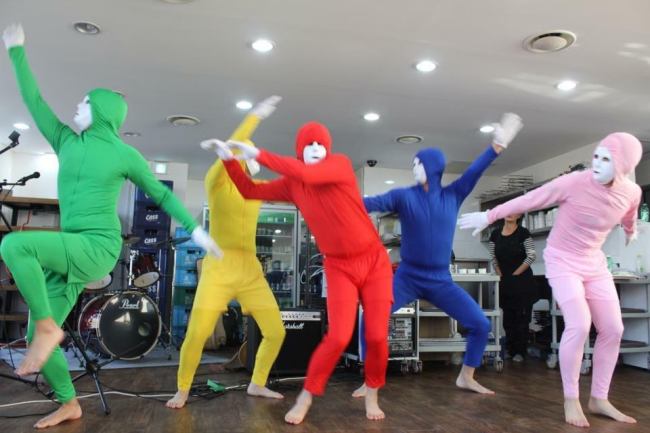A 40-year-old man enters a hall full of graffiti and loud music. People in vibrant tracksuits throw curious glances at him.
He strolls past and opens a door to his left — where his crew awaits. When he greets them, they immediately stop and bow — he is their boss.
This is not a scene from a gangster flick. They belong to a financial company in Seoul, and they gather every weekend for a month each year to learn to dance, all in the name of team spirit.
More Koreans have begun to learn entertainment skills such as singing, dancing, and even making jokes, to use them as part of social skills at workplaces, according to industry sources.
A 26-year-old consulting agent, surnamed Kim, has recently been recruited at a top-tier firm. He was asked to perform at the firm’s end-of-year gathering, alongside his colleagues. The firm’s annual “talent show” offers 1 million won ($830) to the best-performing team, and covers the preparation costs for each one. Beneath the fun, therefore, was a note of competition.
“It’s one of those things that are considered unofficially mandatory,” said Kim, saying he even considered taking vocal classes to prepare.
“It can be fun to spend time with colleagues, but also very grueling. It’s difficult to devote so much personal time for a company event.”
 |
| Employees from a South Korean company perform a dance routine at the firm’s year-end party. (The Korea Herald) |
These “talent shows” held during corporate workshops have existed for decades. Many resent the time-consuming celebration, but the tradition remains deeply embedded within corporate culture.
According to a survey conducted by a local employment search engine Mediatong, the top reason behind company workshop stress is when “superiors propose to make toasts or dance and sing” cited by the majority 47.6 percent.
Shunning such pressure and remaining a bystander is not an easy option, as acquiring the “appropriate finesse” in areas of entertainment and humor has often gained an equal power to being simply good at work.
“I often come across cases where a colleague would get brownie points from the boss for their ability to entertain and mingle,” said Chae Song-hwa, a 38-year-old manager at a company in Seoul.
“But I don’t necessary feel that it is unfair as social skills are also part of one’s capacity. While work accomplishments are easier to evaluate as they come in figures, social skills definitely help in deeming their overall aptitude,” she said.
But this extra yardstick, which in most cases is subjective, is definitely a source of stress, as shown in the survey by Career, an employment portal, last month. Of the 448 respondents, 90.2 percent said they have suffered from extreme anger at work. Majority of them, or 63.8 percent, said it came from maintaining relations with the boss or colleagues.
Another portal Job Korea’s similar report showed that of the 604 surveyed workers in Korea, 48.7 percent viewed the Korean work culture negatively, due mainly to an atmosphere where working overtime is considered the norm (35.4 percent), and “groupism,” where they are forced to do “everything together” (24.2 percent).
Private institutes have taken note of this culture and are capitalizing on it, expanding their courses to cover these new “business” skills.
One dance studio in Gangnam that specializes in training would-be K-pop stars has an entire page on its website dedicated to office workers who want to learn how to groove.
The page is a mural of pictures of different teams from Korea’s most prestigious companies, singing and dancing together. The detailed descriptions below weave tales of comradeship between a superior and his team.
The photos are of at least 30 different teams from various companies, with comments below explaining all had come for the single purpose of outshining others in company events.
The dance course offers personal training for monthly fee of approximately 150,000 won; the fee for vocal training runs higher.
Speech academies have also established separate humor communication classes to keep-up with demands. A speech academy in Jongno, central Seoul, has courses to help its students build confidence by teaching them how to use “humor” in business conversations.
The academy’s faculties are all former TV news anchorwomen or hold degrees related to recreation. A faculty member at the academy explained, “I believe people are interested in learning how to talk with humor, regardless of age to improve their workplace performance.”
“The key to using humor in conversations is ‘confidence’ and that takes time and professional help to build — that is why we’re here for them” she added.
Another academy in Mapo, specializing in humor communications, even teaches its students how to make effective toasts. The head of the academy expressed his passion for humor. “Humor lights us up even in the darkest times,” he said. “We teach our students how to use acrostic poems in their speech during corporate gatherings.”
Both speech academies accept average number of 15 to 20 students per class — there are more attending regular business communication courses, where it also recognizes “humor communication” as a vital ingredient to their agenda. According to a faculty member, the average time students stay in class is three months. Several extend their stay.
By By Jung Min-kyung, Intern reporter (mkj1105@heraldcorp.com)

